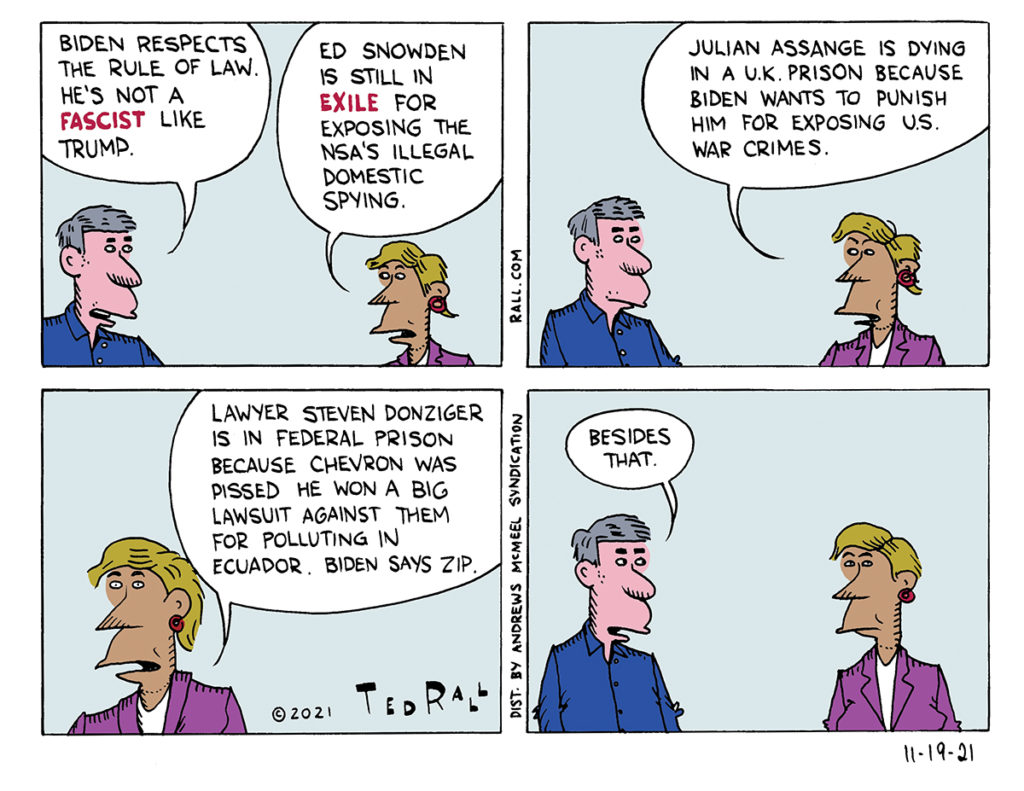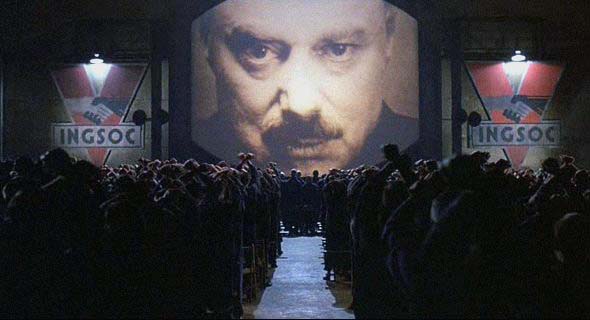On this episode of The Final Countdown, hosts Angie Wong and Ted Rall break down topics from around the world, including South Africa
The Final Countdown – 1/10/24 – Germany Faces Serious Disruptions over Railroad and Farmer Protests
On this episode of The Final Countdown, hosts Angie Wong and Ted Rall cover breaking news from around the globe, including the railroad and farmers’ strikes in Germany.
DMZ America Podcast #112: Ecuadorian Candidate Assassinated, Dark Times for Democracy, the 2024 Election Crisis
Editorial Cartoonist Ted Rall (from the Left) checks in from the road in the maritime provinces of Canada while fellow cartoonist Scott Stantis (from the Right) holds down the fort here in America on this special shortened version of the DMZ America Podcast.
First up, Scott and Ted use the recent assassination in Ecuador of presidential candidate Fernando Villavicencio as a springboard to discuss the wider issue of the seeming crisis of representative democracy across the globe. Is the growing distrust of basic institutions and the failure of the political left to improve the lives of its followers the cause? Or is it the growing aggression of authoritarian forces being seen as the true allies of the working class?
The second segment continues to explore this theme, ending with the conclusion that the Democratic Party has abandoned those it long promised to support, with the consequences being the ascent of far-right political parties across the globe.
Watch the Video Version of the DMZ America Podcast:
DMZ America Podcast Ep 112 Sec 1: Ecuadorian Candidate Assassinated, Dark Times for Democracy
DMZ America Podcast Ep 112 Sec 2: The 2024 Election Crisis
The Final Countdown – 5/18/23 –
On this episode of The Final Countdown, hosts Manila Chan and Ted Rall discuss hot topics, such as the Ukraine-Russia grain deal extension.
SYNDICATED COLUMN: “1984” Is Here. Yawn.
Orwell’s Nightmares Come True — But Who Cares?
Another horror no one will care about: the government is spying on your snail mail.
The New York Times timed the release of the story so that it would come and go without notice: on the Fourth of July, when no one reads the paper or watches the news. But buried beneath a puffy lede is yet another privacy-killing whopper. After 9/11, the Times reports, the U.S. Postal Service created something called the Mail Isolation Control and Tracking (MICT) program, “in which Postal Service computers photograph the exterior of every piece of paper mail that is processed in the United States — about 160 billion pieces last year. It is not known how long the government saves the images.”
Just a wild guess? How about: forever?
“Together,” the paper continued, “the two programs show that postal mail is subject to the same kind of scrutiny that the National Security Agency has given to telephone calls and e-mail.” Any government agency — the FBI, local police, etc. — can request mail cover data. As with the rubber-stamp “FISA court,” the USPS almost always says yes to these outrageous mass violations of privacy.
From George Orwell’s “1984”: “As for sending a letter through the mails, it was out of the question. By a routine that was not even secret, all letters were opened in transit.”
“It’s a treasure trove of information,” the Times quotes former FBI agent James Wedick. “Looking at just the outside of letters and other mail, I can see who you bank with, who you communicate with — all kinds of useful information that gives investigators leads that they can then follow up on with a subpoena.” Your finances. Your politics. Your friends.
No doubt about it, the dystopian vision laid out by George Orwell in “1984” is here.
Thanks to NSA leaker Edward Snowden, we’ve learned about the previously top-secret PRISM program, in which the U.S. government “collects the e-mail, voice, text and video chats” of every American to be stored in a $2 billion data farm in Utah, as well as sweeping telephone surveillance by Verizon and other telecommunications companies on behalf of the NSA. According to NBC News and other sources, “every single phone call made in the U.S. has been monitored by the U.S. government.” And not, merely, as President Obama and his media shills keep saying, “just” (!) the metadata. Under ECHELON, they listen in to “all telephone, fax and data traffic,” record it, and store it.
From “1984”: “There was of course no way of knowing whether you were being watched at any given moment. How often, or on what system, the Thought Police plugged in on any individual wire was guesswork. It was even conceivable that they watched everybody all the time. But at any rate they could plug in your wire whenever they wanted to.”
Yes they can.
The dominant eavesdropping technology in “1984” was a device called the “telescreen.” Installed in every home and workplace as an outlet for government propaganda, Orwell’s telescreen “received and transmitted simultaneously. Any sound that Winston made, above the level of a very low whisper, would be picked up by it, moreover, so long as he remained within the field of vision which the metal plaque commanded, he could be seen as well as heard.”
Which sounds a lot like the creepy new two-way TV — you watch it and it watches you — for which Verizon filed a patent application in 2011. This TV would target “ads to viewers based on information collected from infrared cameras and microphones that would be able to detect conversations, people, objects and even animals that are near a TV. If the detection system determines that a couple is arguing, a service provider would be able to send an ad for marriage counseling to a TV or mobile device in the room,” reported the blog Fierce Cable. “If the couple utters words that indicate they are cuddling, they would receive ads for ‘a romantic getaway vacation, a commercial for a contraceptive, a commercial for flowers,’ or commercials for romantic movies, Verizon states in the patent application.”
Verizon’s patent was denied. But now Google TV is going for it. The technology exists; it’s only a matter of time before it finds its way into our homes. Anti-privacy tech types point out it’s only to make ads more effective — the same way web ads react to your searching and browsing. But that’s just for now. It isn’t a stretch to imagine the NSA, FBI or other crazy spook outfit tapping into America’s telescreens in order to watch us in our living rooms and bedrooms.
Gotta stop the terrorists! Whatever it takes.
Ah, the terrorists. The enemies of the state. Bush had his Osama; Obama has Snowden. Bugaboos keep us distracted, fearful, compliant. “The heretic, the enemy of society, will always be there, so that he can be defeated and humiliated over again,” the government official goon O’Brien lectures Winston Smith in “1984.” “The espionage, the betrayals, the arrests, the tortures, the executions, the disappearances will never cease.”
They can’t.
Governments rule over the governed either by obtaining their tacit consent, or by crushing potential opponents by making them afraid to speak up. Option two is where we are now.
One horror follows another. At Guantánamo concentration camp, where les misérables of America’s War of Terror languish for year after year, uncharged with any crime, U.S. government goons announced that they will continue to force-feed more than 100 hunger strikers during Ramadan, a month-long holiday when devout Muslims are required to fast. WikiLeaks founder Julian Assange is trapped in the Ecuadorean embassy in London because he fears extradition to and execution by the U.S.; Ecuador has discovered that some Western intelligence agency planted a bug to watch him. Meanwhile, Edward Snowden has been de facto stripped of his U.S. citizenship, his passport canceled, rendering him effectively stateless. Meanwhile, the megacriminals he exposed — Obama and his cronies — are living large.
Assange and Snowden are no longer important. They’ve done all the damage they can do. But the U.S. will never leave them, or any other enemy of the state, alone. It’s about terrifying potential political opponents into submission.
“Do not imagine that you will save yourself, Winston, however completely you surrender to us. No one who has once gone astray is ever spared,” O’Brien tells Winston. “We shall squeeze you empty, and then we shall fill you with ourselves.”
Enjoy your barbecue.
(Ted Rall’s website is tedrall.com. His book “After We Kill You, We Will Welcome You Back As Honored Guests: Unembedded in Afghanistan” will be released in 2014 by Farrar, Straus & Giroux.)
COPYRIGHT 2013 TED RALL
AL JAZEERA COLUMN: Tied to a Drowning Man
The interconnectedness of the world economy means that US economic woes will have severe effects on others.
During the Tajik Civil War of the late 1990s soldiers loyal to the central government found an ingeniously simple way to conserve bullets while massacring members of the Taliban-trained opposition movement. They tied their victims together with rope and chucked them into the Pyanj, the river that marks the border with Afghanistan. “As long as one of them couldn’t swim,” explained a survivor of that forgotten hangover of the Soviet collapse as he walked me to one of the promontories used for this act of genocide, “they all died.”
Such is the state of today’s integrated global economy.
Interdependence, liberal economists believe, furthers peace—a sort of economic mutual assured destruction. If China or the United States were to attack the other, the attacker would suffer grave consequences. But as the U.S. economy deteriorates from the Lost Decade of the 2000s through the post-2008 meltdown into what is increasingly looking like Marx’s classic crisis of late-stage capitalism, internationalization looks more like a suicide pact.
Like those Tajiks whose fates were linked by tightly-tied lengths of cheap rope, Europe, China and most of the rest of the world are bound to the United States—a nation that seems both unable to swim and unwilling to learn.
The collapse of the Soviet Union, a process that began in the 1970s and culminated with dissolution in 1991, had wide-ranging international implications. Russia became a mafia-run narco-state; millions perished of famine. Weakened Russian control of Central Asia, especially Afghanistan, set the stage for an emboldened and highly organized radical Islamist movement. Not least, it left the United States as the world’s last remaining superpower.
From an economic perspective, however, the effects were basically neutral. Coupled with its reliance on state-owned manufacturing industries to minimize dependence upon foreign trade, the USSR’s use of a closed currency ensured that other countries were not significantly impacted when the ruble went into a tailspin.
Partly due to its wild deficit spending on the gigantic military infrastructure it claimed was necessary to fight the Cold War—and then, after brief talk of a “peace dividend” during the 1990s, even more profligacy on the Global War on Terror—now the United States is, like the Soviet Union before it, staring down the barrel of economic apocalypse.


